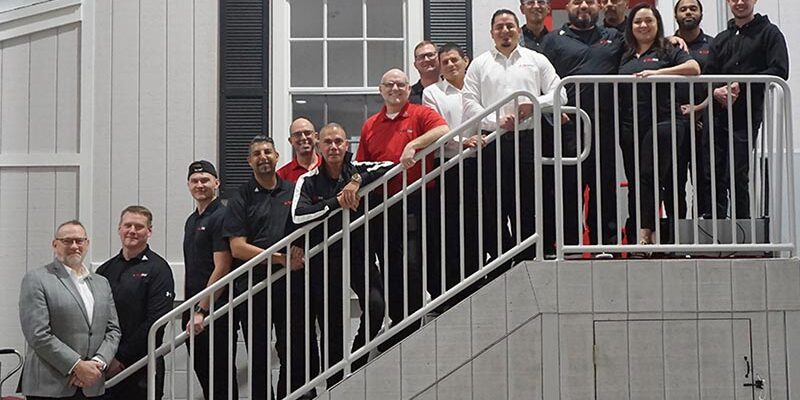Fishing for Workers in a Depleted Pond

By Chuck Violand
It’s no secret that the biggest challenge businesses of all sizes and in all industries have faced in recent years is finding and keeping talented workers, and this has been exacerbated by the labor shortage following the pandemic shutdown. This challenge is not going away anytime soon, but you can tilt the playing field in your favor by taking a slightly different approach to recruiting workers and retaining them.
With record-high unemployment causing intense competition for talented people at every level in business, from frontline workers to senior managers, it’s more important than ever to view the recruiting process in a different light. This is especially true for small businesses that need to compete within the same pool of candidates as well-funded, multinational companies.
Culture counts
In 2020, our organization wrote a comprehensive guide to recruiting and keeping the talent a small business needs to grow and continue to compete. Our research and experiences working with small businesses found the key to attracting these workers isn’t rooted in bidding up salaries, offering unsustainable perks, or writing cute employment ads.
Instead, attracting workers has to do with creating a company culture that makes people want to go to work and where they can find meaning in their work that goes beyond the tasks they perform. Admittedly, this can be tough to do in a carpet cleaning or restoration company where many of the company’s employees are essentially “remote workers,” rarely gathered together inside the business. It always requires hard work on the part of the company’s leadership, but it can be done.
Rather than starting the hiring process by looking at external factors or tangible rewards, we suggest starting the search by looking internally—at both the company and the company’s leadership.
Tough questions
When your goal is recruiting workers who are serious about building a career rather than just working for their next paycheck, you must realize that these top-notch candidates will have dramatically higher expectations of the companies to which they are applying. Just as you ask tough questions during an interview in an effort to make a sound hiring decision, talented candidates also want to be sure they are making the right career decision when hiring into a company.
By candidly considering a few hardball questions before recruiting new hires, you can gain valuable insights into just how attractive your company will be to highly talented candidates. Ask yourself how well you’d score if I asked you the following questions during my job interview.
If I had the chance to speak privately with three of your current employees, how would they describe you as a business leader and as a person?
If it were me asking this question, I would want to know how long each of these employees has been with your company. This would give me insights into the company’s culture and into you as a business leader. If they’ve been with the company for a long time, I would want to know why they have stayed. If they haven’t, I would be asking if they were hired to fill a vacated position, and if so, why the former employee left.
A high turnover rate in service-based businesses is a key performance indicator too many of us accept as a given and do little more than pay lip service to changing. When we get serious about lengthening our average employment tenure, it will include the difficult task of taking a candid look at the company culture, listening closely to our current employees’ needs, and demonstrating that they are heard and cared for.
On a professional level, how do you manage your people and the business?
Is the company growing? Why or why not? How aggressively are you pursuing new business? How aggressively are you marketing your services? Do you know why your customers buy from you and not from your competitors?
True professionals are looking for professional disciplines and practices. As someone who is looking for growth and opportunity, I would want to hear that all positions and departments in the organization are given clear performance expectations and that performance is measured against challenging, yet realistic, goals.
I would also want to know that this philosophy is supported in practice through routine feedback, reporting, meetings, evaluations, coaching, and support. Don’t just say, “There is the goal; go get it.” Provide the resources, training, and support necessary to be successful.
How do you conduct yourself, and what do you stand for?
I don’t expect anyone to be a saint, but I need to know if I should worry about the future of the company because of reckless behavior—behavior that might cause you to make impaired business decisions or might show up in the news or in a YouTube video, embarrassing me and the company and possibly threatening our futures.
In the same way that most parents are blind to the shortcomings of their own children, most business owners are blind to their company’s deficiencies and the way others see them. Without an emotional attachment, most people see both children and companies as they really are. Asking yourself tough questions in an attempt to gain an outsider’s view before someone else asks them can help you build a workplace and a culture where people want to build their careers.
What have you done in the last three months to recognize outstanding performance by one of your people or teams?
All-expenses-paid trips or unsustainable raises aren’t expected, but do you recognize people with a simple “thank you” when they do a good job? Do you ask for their opinions and solicit their input before making business decisions? High-level candidates have more to offer than just a strong back and great customer service. Are you a strong enough business leader not to be threatened when one of your employees offers their opinion or actually wants to take ownership of their job?
What areas of professional growth are you, yourself, working on right now?
There’s a short ladder to climb in most small businesses, and I’m probably not going to pass you while you’re standing on it. This means my professional growth and income potential is limited by yours. Since I’m the kind of employee who’s looking to make a contribution to the company where I work and who wants to grow in my career, I want a business owner who’s doing the same. So, do you invest time and money in your own professional growth, or has your thinking and management style calcified into “This is the way we’ve always done things”?
Are the work issues that keep you up at night now any different from those that kept you up at night a year ago?
When I have a business-related problem that I’m not able to resolve, I’m going to ask you for help. Where are you seeking help from if you’re continuing to struggle with the same problems?
If you won the lottery tomorrow, would you close the business?
If your answer to this question is yes or if you even hesitated when I asked it, then why would I want to risk my future by coming to work at your company? It’s not that I’m worried about you actually winning the lottery, but this might be an indication that you’ve mentally checked out, you’re burned out, or you’re just not committed for the long haul. None of these are good from a company’s growth perspective because it means the company isn’t getting your full efforts. And if you’re not willing to give the business everything you’ve got, why would I?
Final thoughts
In the current job market, highly talented job seekers can afford to be selective about the companies they consider, making it more important than ever for small businesses to correct internal deficiencies before recruiting workers. Asking tough questions about ourselves and our businesses can help us identify and address these deficiencies and not only attract the best employees, but also keep them.
Chuck Violand is the founder and principal of Violand Management Associates (VMA), a highly respected consulting company in the restoration and cleaning industries. Through VMA, he works with business owners and companies to develop their people and profits. For more information, visit www.violand.com.












